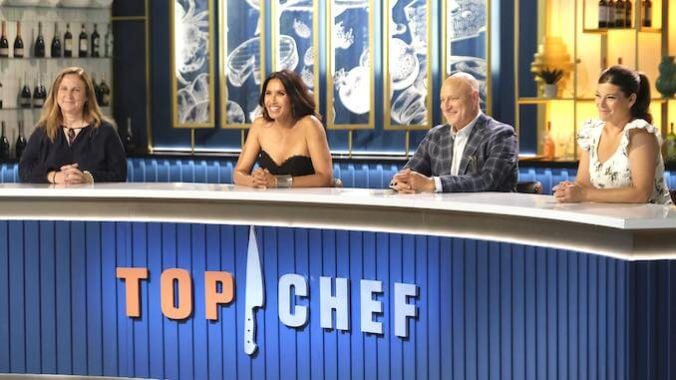Reality AF: Top Chef’s Gail Simmons & Tom Colicchio on Season 20, Their Approach to Judging, and Their Chef Mount Rushmore
Photo Courtesy of Bravo
Editor’s Note: Welcome to Reality AF, where Terry Terrones checks in on the state of reality TV, or, in this case, catches up with some of the biggest names in the game.
![]()
Get your knives and forks ready, Top Chef returns for its 20th season on March 9. The James Beard Award-winning series, which airs on Bravo and is available next day on Peacock, is going international this season for its emerald anniversary, and crossing the pond to kick off its season in jolly old England. But that’s not the only big change fans of the competitive culinary series can expect.
The lineup of chefs is loaded with 16 finalists and winners representing 11 different iterations of Top Chef from around the globe, all vying for the World All-Stars title. To prep for this season, I chatted with judges Tom Colicchio and Gail Simmons, who have been with the series since it premiered in 2006. Here’s an excerpt from our conversations, edited for length and clarity.

Paste Magazine: How has Top Chef evolved over 20 seasons?
Tom Colicchio: Little things are constantly changing, but it usually is situational. Going back to the Chicago season, we were going around to different stations and trying different dishes. And so we were sitting around afterwards waiting to go back to the judges’ table and we started talking about some of the dishes. A producer came over and said, “Hey, save it for judges’ table.” And I said, “Well, why don’t you just shoot this?” And they’re like, “Okay.” So that started what we call the mini-deliberation that we started doing at the venue, or right after we ate.
Little things like that have changed over time. We just try different things to make different suggestions, and try to keep it fresh. But I think ultimately, nothing has changed. The chefs have to cook food, they have a challenge, there’s time allotted. Cook, we eat, we judge, and that’s it.
Paste: What’s changed when it comes to the way people view food?
Colicchio: I think that food has become part of the zeitgeist and so people are demanding better food, and not just in restaurants, I mean everywhere. I also think that food on TV and Top Chef probably had something to do with that because people see what chefs are going through for the food that they’re making. The general population is starting to realize that chefs put a lot of thought and care into what they’re doing and it’s exciting. I think people understand why one restaurant is more expensive than the other, and food has just become part of pop culture. When that happens, you have more people that are interested in cooking, more people that are interested in choosing it as a profession. I mean, 40 years ago when I started to become a chef and choose my profession, there weren’t a lot of parents encouraging their kids to do that but now it’s become acceptable.
What happens now is you get a lot of young cooks who come to the big cities. When I was coming up it was New York, LA, San Francisco, Chicago, that was about it. So they come to these cities and then they go back home and they open restaurants. Look at Sara (Bradley), who’s from Kentucky. She worked all around New York, had a great experience, and then she’s back to her small town Paducah, Kentucky to open restaurants, and is doing quite well. Now you have a really well-trained chef who’s back in Paducah doing great food. So if you’re traveling in that area and you go, “Well, you have good options.” And that’s happening everywhere in the country, and I think it’s happening in most other countries as well.
-

-

-

-

-

-

-

-

-

-

-

-

-

-

-

-

-

-

-

-

-

-

-

-

-

-

-

-

-

-

-

-

-

-

-

-

-

-

-

-









































